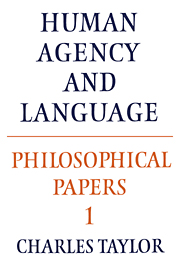9 - Language and human nature
Published online by Cambridge University Press: 05 June 2012
Summary
Language is a central area of concern in the twentieth century. This is evident on all sides. First, our century has seen the birth and explosive growth of the science of linguistics. And in a sense ‘explosive’ is the right word, because like the other sciences of man, linguistics is pursued in a number of mutually irreducible ways, according to mutually contradictory approaches, defended by warring schools. There are structuralists in the Bloomfieldian sense, there are proponents of transformational theories, there are formalists.
These schools and others have made a big impact. They are not just collections of obscure scholars working far from the public gaze. Names like Jakobson and Chomsky are known far outside the bounds of their discipline.
But what is even more striking is the partial hegemony, if one can put it this way, that linguistics has won over other disciplines. From Saussure and the formalists there has developed the whole formidable array of structuralisms, of which Lévi-Strauss is the pathfinder, which seek to explain a whole range of other things: kinship systems, mythologies, fashion (Barthes), the operations of the unconscious (Lacan), with theories drawn in the first place from the study of language. We find terms like ‘paradigm’, ‘syntagm’, ‘metaphor’, ‘metonymy’, used well beyond their original domain.
- Type
- Chapter
- Information
- Philosophical Papers , pp. 215 - 247Publisher: Cambridge University PressPrint publication year: 1985
- 36
- Cited by



